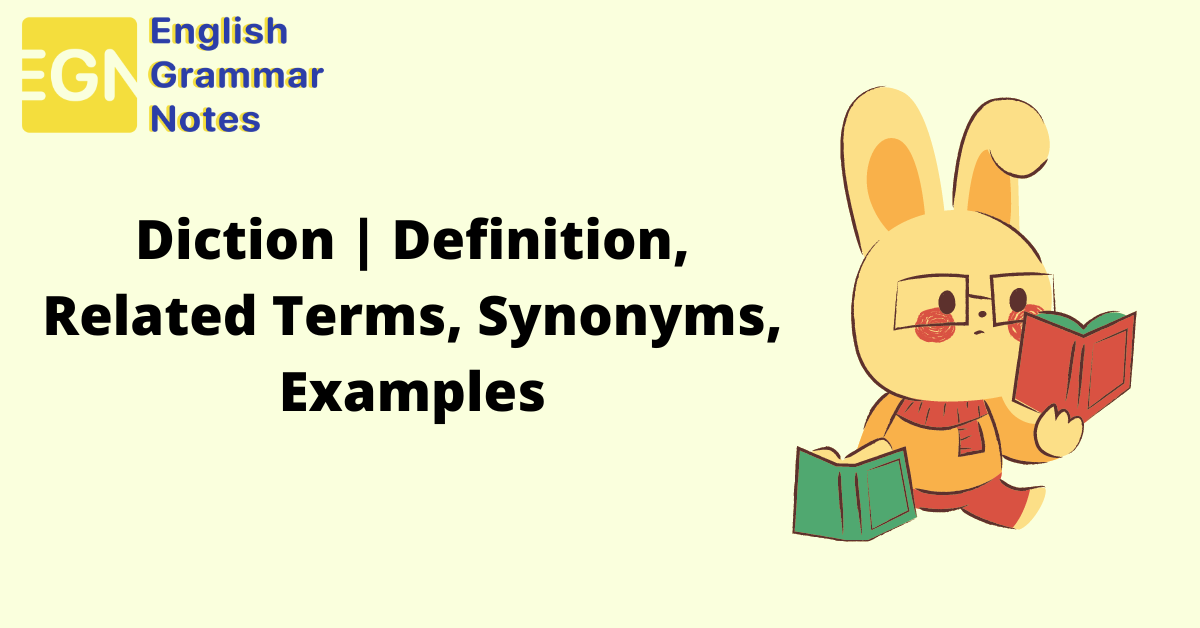Diction is one of the common literary devices employed by writers. The linguistic choices that you make to convey an idea, or a point, or tell a story can be called diction. Comprehending the style of work involves identifying and understanding the diction, that is, the type and quality of individual words that make up the work. In this article, you will be introduced to all the essential information about diction, including its definition, types, its significance, synonyms, etc.
- Diction Definition
- Diction’s Purpose
- 8 Types of Diction
- Diction Vs. Dialect
- Synonyms for Diction
- FAQs on Diction
Diction Definition
Diction refers to the careful selection of words to depict a message or introduce a particular voice or writing style. For example, its figurative language creates a colorful poem, while a more formal vocabulary is suitable to drive home a point. The selection of words or vocabulary and their appropriate arrangement contribute to the style and establish the voice of a literary work.
Diction’s Purpose
The use of specific words and vocabulary has its own benefits. These include:
- Diction helps to create a tone that defines the purpose of your work.
- In fiction, the words an author uses constitute the basic story elements, like the setting.
- The words used by an author establish the writer’s attitude towards the subject.
- The characters in a work can be brought to life through the words you use to describe them.
Check out Literary Devices that every writer should know as a part of expanding their knowledge base.
8 Types of Diction
Different types of diction result in expressing different kinds of ideas:
- Formal diction makes use of sophisticated language and avoids slang or colloquial language. Formal diction relies on grammatical rules and complicated syntax.
- Informal diction: conversational and used in narrative literature. representative of everyday conversations in real life, which gives you the freedom to depict more realistic characters. Informal diction is mostly seen in short stories and novels.
- This is a diction that is appropriate for detailed academic writing. Words are used to convey only one meaning.
- Colloquial diction. This usage makes use of informal words and represents a certain region or time. “Ain’t” and “y’all”, etc. are colloquial expressions.
- Slang definition: words that originated within a specific culture or subgroup but gained prominence. A slang word can be a new word, an existing word that has been modified, or a word that has taken on a new meaning.
- This type of diction makes use of words that express something intangible, like an idea or an emotion.
- concrete diction. makes use of words that convey meanings and often refers to things that appeal to the senses.
- Poetic diction: Poetic diction uses lyrical words that highlight a specific theme in a poem. Poetic diction includes the use of descriptive language.
Also read,
Diction Vs. Dialect
Diction and dialect are two distinct terms with different meanings:
- A dialect refers to a variety of spoken languages used by a community or group of people.
- On the other hand, diction refers to the linguistic choice, that is, the choice of words made by a writer to convey the story.
Synonyms for Diction
The word “diction” has a long list of meanings. Some synonyms include wording, phraseology, phrasing, rephrasing, turn of a phrase, choice of words, use of language, language, parlance, vocabulary, terms, terminology, jargon, idiolect, locution, etc.
FAQs on Diction
Q1. What is diction?
Ans: Diction refers to the careful selection of words to depict a message or introduce a particular voice or writing style.
Q2. What are the different types of dictionaries?
Ans: The different types of diction include formal diction, informal diction, pedantic diction, colloquial diction, etc.
Q3. What is pedantic diction?
Ans: This kind of diction is used in academic writing and makes use of sophisticated words and expressions.
Q4. What are the benefits of using diction?
Ans: The use of appropriate vocabulary helps you to convey the tone and purpose of your writing. The characters of the work are brought to life through the words that describe them. Diction also constitutes the basic elements of a story, such as the setting.
Conclusion
Each word has a different meaning and evokes different senses and emotions. Using the right words for your purposes determines what dialect you are using. Using the right diction is important as it plays an important role in determining the tone and purpose of your writing. Identifying the audience will make sure that you employ the most appropriate diction.
